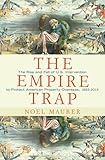The empire trap : the rise and fall of the U.S. intervention to protect American property overseas, 1893-2013 / by Noel Maurer.
Material type: TextPublication details: Princeton, N.J. : Princeton University Press, (c)2013.Description: 1 online resource (ix, 558 pages) : illustrations, mapContent type:
TextPublication details: Princeton, N.J. : Princeton University Press, (c)2013.Description: 1 online resource (ix, 558 pages) : illustrations, mapContent type: - text
- computer
- online resource
- 9781400846603
- 9781299747906
- HF1455 .E475 2013
- COPYRIGHT NOT covered - Click this link to request copyright permission: https://lib.ciu.edu/copyright-request-form
| Item type | Current library | Collection | Call number | URL | Status | Date due | Barcode | |
|---|---|---|---|---|---|---|---|---|
 Online Book (LOGIN USING YOUR MY CIU LOGIN AND PASSWORD)
Online Book (LOGIN USING YOUR MY CIU LOGIN AND PASSWORD)
|
G. Allen Fleece Library ONLINE | Non-fiction | HF1455 (Browse shelf(Opens below)) | Link to resource | Available | ocn854754334 |
Includes bibliographies and index.
Introduction -- Avoiding the trap -- Setting the trap -- The trap closes : The Mexican exception -- Banana republicanism -- Escaping by accident -- Falling back in -- The empire trap and the Cold War : Ethiopia and Nicaragua -- The success of the empire trap -- Escaping by design? -- The empire trap in the twenty-first century.
"Throughout the twentieth century, the U.S. government willingly deployed power, hard and soft, to protect American investments all around the globe. Why did the United States get into the business of defending its citizens' property rights abroad? The Empire Trap looks at how modern U.S. involvement in the empire business began, how American foreign policy became increasingly tied to the sway of private financial interests, and how postwar administrations finally extricated the United States from economic interventionism, even though the government had the will and power to continue. Noel Maurer examines the ways that American investors initially influenced their government to intercede to protect investments in locations such as Central America and the Caribbean. Costs were small - at least at the outset - but with incremental step, American policy became increasingly entangled with the goals of those they were backing, making disengagement more difficult. Maurer discusses how, all the way through the 1970s, the United States not only failed to resist pressure to defend American investments, but also remained unsuccessful at altering internal institutions of other countries in order to make property rights secure in the absence of active American involvement. Foreign nations expropriated American investments, but in almost every case the U.S. government's employment of economic sanctions or covert action obtained market value or more in compensation - despite the growing strategic risks. The advent of institutions focusing on international arbitration finally gave the executive branch a credible political excuse not to act. Maurer cautions that these institutions are now under strain and that a collapse might open the empire trap once more. With shrewd and timely analysis, this book considers American patterns of foreign intervention and the nation's changing role as an imperial power."--Provided by publisher.
COPYRIGHT NOT covered - Click this link to request copyright permission:
There are no comments on this title.
